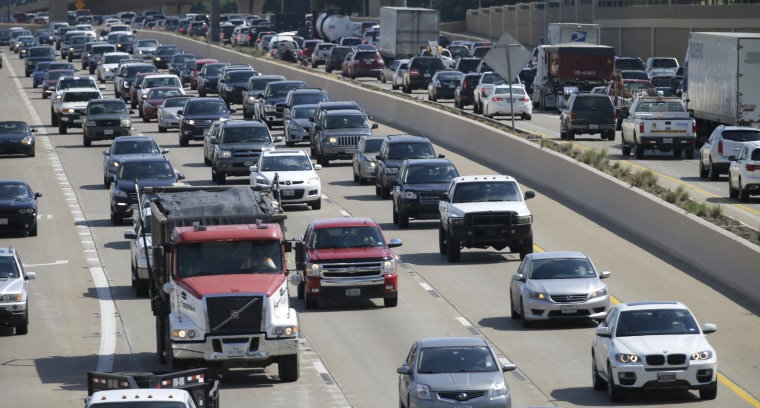A record-breaking number of Americans are traveling this July 4 weekend, sparking safety concerns after a particularly deadly year on the roads and security concerns in the wake of recent national and international terror attacks.
Nearly 43 million Americans are expected to hit the the roads, rails, skies and seas between June 30 and July 4 — 5 million more travelers than this year's Memorial Day weekend and the highest volume of travelers on record for the July 4 holiday weekend, according to AAA.
The uptick is largely due to lower gas prices with the national average at $2.30 a gallon, which is 47 cents less than last year, AAA said.
While the price of a flight hasn't fallen as drastically, domestic round-trip tickets have dipped by 9 percent, and hotel prices are also slightly cheaper as compared with last year, according to AAA.
The holiday falls on a Monday, which is also encouraging people to get out of town.
"Historically, whenever July 4 happens to fall on a Friday or a Monday, as it does this year, it essentially becomes a four-day holiday weekend for most travelers," said John Townsend II, a spokesman for the AAA Mid-Atlantic.
While the travel industry rejoices, officials are planning accordingly to keep travelers and revelers safe.
The weeks leading up to July 4 weekend saw deadly terror attacks in Orlando, Florida, and internationally in Istanbul and Bangladesh, and officials say security will continue to be tight at airports and places where masses of people are gathering for holiday events.
"If you are in a 'marquee' airport, you should absolutely allow significantly more time, on the order of 30 to 45 minutes," Bruce McIndoe, the chief executive officer of travel risk advisory company iJet International, told Reuters.
While time-consuming, McIndoe said, passengers can feel safer knowing that authorities will "dial up" security measures, such as random screenings and increasing sensitivity of metal detectors.
At O'Hare International Airport in Chicago, officers could be seen in military-style gear, which is not the norm, The Associated Press reported.
In Florida, Miami-Dade Police were pulling over drivers at random on the roads leading to Miami International Airport for security sweeps, NBC Miami said. Armed officers were also monitoring the arrivals area of the airport — the same area where bombs went off at Istanbul's Ataturk Airport on Tuesday, leaving 45 dead.
Meanwhile, the Port Authority of New York and New Jersey, which oversees three major airports, said officials are ratcheting up measures. More than 9 million people are expected to fly into or out of John F. Kennedy International, LaGuardia and Newark Liberty International airports, the Port Authority added.
"Traveling on a major holiday is risky for many reasons."
New York City was also ramping up security for the Macy's Fourth of July fireworks display, deploying a new critical response team, specially trained K9s that can detect explosives and radiation detection units, reported NBC New York.
"We would be able to respond if something occurred," said NYPD Commissioner Bill Bratton, adding that there was no specific threat against the event, in which 3 million people are expected to attend.
Boston's Fireworks Spectacular, featuring Demi Lovato and Nick Jonas, will also be heavily monitored. "Citizens who join us for celebration will do with confidence and assurance that every possible precaution has been taken," said Massachusetts State Police Col. Richard McCune.
While officials can take measures to keep people safe at events and in travel hubs, there's only so much they can do to keep the roads safe.
Related: July 4th Traffic: 7 Driving Tips for Deadliest Day On Road
The majority of July 4 weekend travelers — 84 percent — will drive to their hot dog-heavy destinations, according to AAA. But with barbecues also comes alcohol, which is a main reason July 4 travel is the deadliest day on the roads, according to the Insurance Institute for Highway Safety.
"Traveling on a major holiday is risky for many reasons," said Chuck Farmer, the institute's vice president for research and statistical services. "In general, there are more people on the roads, and drivers may be navigating areas beyond their regular commuting routes. There's a high incidence of alcohol use, which sharply raises the risk of crashing."
About 35,200 people died in traffic crashes in 2015, which was about 8 percent more than the year before, according to the U.S. Department of Transportation’s National Highway Traffic Safety Administration, prompting officials to warn drivers to be especially careful behind the wheel over the holiday.
"This weekend Americans should take extra care to ensure they get to their destinations safely,” said Transportation Secretary Anthony Foxx.

